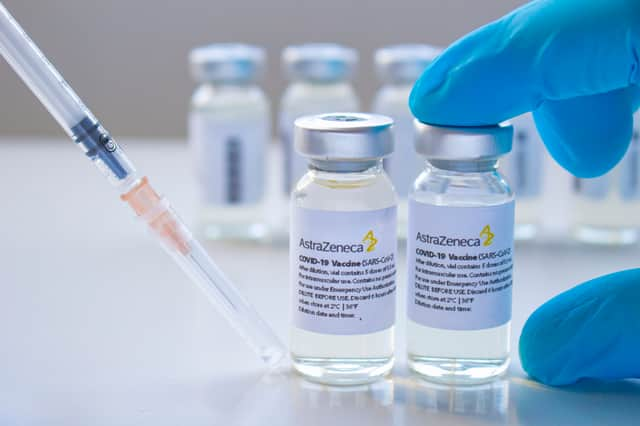7 people die from blood clots in UK after AstraZeneca Covid vaccine - but regulator says it’s safe


Seven people have died after developing blood clots after getting the Oxford/AstraZeneca Covid-19 vaccine in the UK, the medicines regulator has said.
The Medicines and Healthcare Products Regulatory Agency (MHRA) confirmed that of the 18.1 million given the Oxford jab by 24 March, 30 people later developed blood clots.
Is the vaccine safe?
Advertisement
Hide AdAdvertisement
Hide AdThe UK regulator has said it is still not clear if the development of blood clots in this small number of cases is just a coincidence, or if it is a genuine side effect of the vaccine.
However, the MHRA still maintains that the benefits of the vaccine continue to outweigh any risk.
Investigations are now under way to determine if the AstraZeneca vaccine is causing the very rare blood clots, and it comes after the European Medicines Agency said earlier this week that it was “not proven, but is possible”.
The vaccine has come under much scrutiny in recent weeks over concerns it could be linked to blood clots, with some countries in Europe suspending its use.
Advertisement
Hide AdAdvertisement
Hide AdGermany has paused its use among people aged under 60 after reporting 31 cases of a type of rare blood clot among the nearly 2.7 million people who have received the jab in the country.
France, the Netherlands and Canada have also restricted the vaccine's use only to older people.
However, the head of the European Medicines Agency (EMA) has said there is “no evidence” to support restricting the Oxford/AstraZeneca vaccine in any population.
What has the UK regulator said?
Data released by the MHRA on Friday (2 April) showed 22 cases of cerebral venous sinus thrombosis (CVST), which is a type of blood clot in the brain. These were accompanied by low levels of platelets, which help form blood clots, in the body.
Advertisement
Hide AdAdvertisement
Hide AdThe regulator also found other clotting problems, alongside low platelet levels, in eight people. Sadly, of these 30 people, seven had died by 24 March.
The MHRA's chief executive, Dr June Raine, said: "The benefits of Covid-19 Vaccine AstraZeneca in preventing Covid-19 infection and its complications continue to outweigh any risks and the public should continue to get their vaccine when invited to do so."
“Causally related”
While the MHRA, the EMA and the World Health Organisation (WHO) maintain that the vaccine is both safe and effective, a scientist has suggested that the growing occurrence of rare blood clot events among people who have had the jab is “causally related”.
Professor Paul Hunter, a medical microbiologist at the University of East Anglia, told the BBC Radio 4 Today programme: “It is not uncommon to get clusters of rare events purely by chance.
Advertisement
Hide AdAdvertisement
Hide Ad“But, once you find that cluster in one population and it then crops up in another – such as previously in the German and now in the English – then I think the chances of that being a random association is very, very low.
“Clearly more work needs to be done, but I think the evidence is shifting more towards it being causally related at the moment.”
However he said that the risks of taking the AstraZeneca vaccine still far outweighed the risks of not getting the jab at all.
Prof Hunter added: “The chance of dying if you don’t have the vaccine is many times greater than the risk of dying from CVT (cerebral venous thrombosis) after the AstraZeneca vaccine, even if it does turn out, as I suspect it will, that this link is causal.”